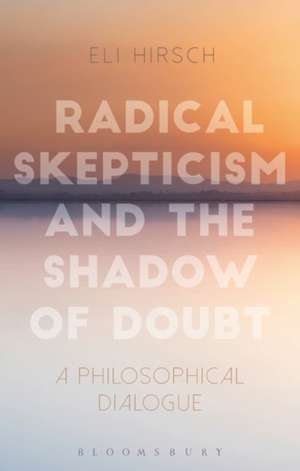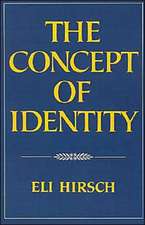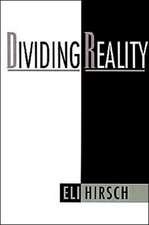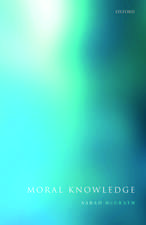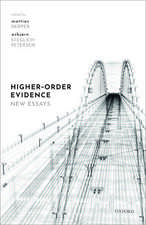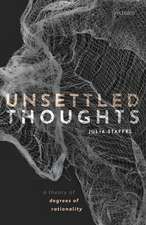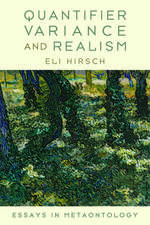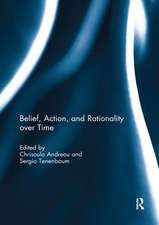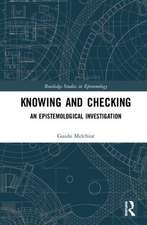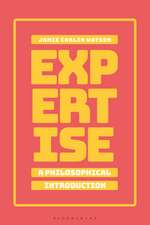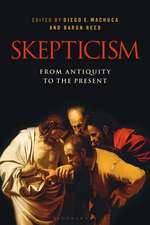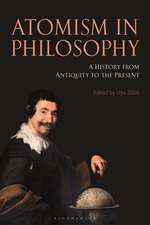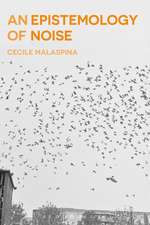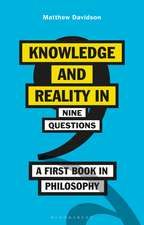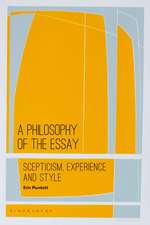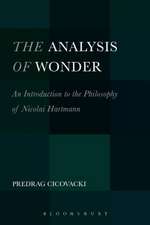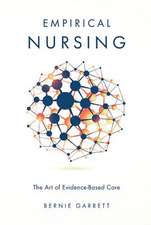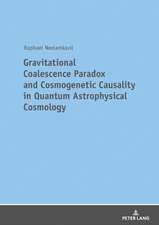Radical Skepticism and the Shadow of Doubt: A Philosophical Dialogue
Autor Eli Hirschen Limba Engleză Paperback – 27 dec 2017
| Toate formatele și edițiile | Preț | Express |
|---|---|---|
| Paperback (1) | 159.11 lei 3-5 săpt. | |
| Bloomsbury Publishing – 27 dec 2017 | 159.11 lei 3-5 săpt. | |
| Hardback (1) | 466.46 lei 6-8 săpt. | |
| Bloomsbury Publishing – 27 dec 2017 | 466.46 lei 6-8 săpt. |
Preț: 159.11 lei
Preț vechi: 173.10 lei
-8% Nou
30.44€ • 31.79$ • 25.14£
Carte disponibilă
Livrare economică 25 martie-08 aprilie
Specificații
ISBN-10: 1350033855
Pagini: 248
Dimensiuni: 138 x 216 x 23 mm
Greutate: 0.32 kg
Editura: Bloomsbury Publishing
Colecția Bloomsbury Academic
Locul publicării:London, United Kingdom
Caracteristici
Notă biografică
Eli Hirsch is Charles Goldman Professor of Philosophy at Brandeis University, USA. He is the author of Dividing Reality (OUP, 1999) and Quantifier Variance and Realism: Essays in Metaontology (OUP, 2011).
Cuprins
IntroductionI. Vatol's anxietyIntroduction to Lev's questionThe example of VatolYitzhak's reaction to skepticism, and Williamson'sOn the nature of this workThe "two-level" view of the impossibility of doubtThe meaning of "reasons" to doubtRelationships between "doubt", "belief", "assertion", and "certainty"Further connections between "doubt", "anxiety", and "knowledge"Interlude: Waiting for GodotA connection to Nagel's skepticismInterlude: philosophy and comedyA challenge to Lev's assumptions about epistemic anxietyII. Vatol and UsThe n-to-n+1 argumentA safety condition on beliefInterlude: memories of BerkeleyPryor's epistemic principleDistinction between one-level and two-level casesInterlude: Talmudic connectionsThe "non-circularity" conditionDaniel 's challenges to Yitzhak's viewYitzhak's stringent response to "entering a loop"Yitzhak's Austinian answer to the problem of dreamsInterlude: finding an "eitzah"Daniel's two additional questionsSummaryLev's disagreement with YitzhakIII. The Impossibility of DoubtLev's past epistemic anxietyInterlude: Memories from YeshivaLev's first argument for the impossibility of doubtThe first premise of Lev's first argumentA question about valuing one's life on the basis of probabilitiesA comparison of Lev's position with Kant's and Wittgenstein'sInterlude: Yitzhak's taleLev's second argumentThe meaning of "having a self"Interlude: Yitzhak's pride and shameRelationship between the notions of "self" and "identification"Broughton's suggestion that Hume did not identity with his belief in an external realityLev's epistemic attitudeEndnotesReferences
Recenzii
Descriere
Radical Skepticism and the Shadow of Doubt brings something new to epistemology both in content and style. At the outset we are asked to imagine a person named Vatol who grows up in a world containing numerous people who are brains-in-vats and who hallucinate their entire lives. Would Vatol have reason to doubt whether he himself is in contact with reality? If he does have reason to doubt, would he doubt, or is it impossible for a person to have such doubts? And how do we ourselves compare to Vatol? After reflection, can we plausibly claim that Vatol has reason to doubt, but we don't? These are the questions that provide the novel framework for the debates in this book. Topics that are treated here in significantly new ways include: the view that we ought to doubt only when we philosophize; epistemological "dogmatism"; and connections between radical doubt and "having a self." The book adopts the innovative form of a "dialogue/play." The three characters, who are Talmud students as well as philosophers, hardly limit themselves to pure philosophy, but regale each other with Talmudic allusions, reminiscences, jokes, and insults. For them the possibility of doubt emerges as an existential problem with potentially deep emotional significance. Setting complex arguments about radical skepticism within entertaining dialogue, this book can be recommended for both beginners and specialists.
